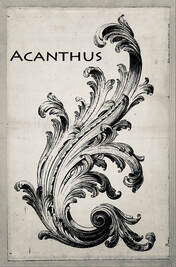Acanthus

Our journal takes its name from the acanthus plant, seen carved into the capitals of Corinthian columns. The plant takes its name from the myth of Acantha, a nymph loved by the god Apollo. As is often the case in mythology, Acantha rebuffed Apollo's advances, and scratched his face. In a fit of god-like anger, Apollo transformed her into the Acanthus, a plant that was beautiful to gaze upon, but whose spiky thorns pricked any who dared to approach it. Its name reflects our belief that art should attract our gaze, but also can tear at the soul.
Acanthus is published quarterly, in November, February, May, and August. It explores art, creative thought, and the research process, crossing borders both disciplinary and physical.
Our journal takes its name from the acanthus plant, seen carved into the capitals of Corinthian columns. The plant takes its name from the myth of Acantha, a nymph loved by the god Apollo. As is often the case in mythology, Acantha rebuffed Apollo's advances, and scratched his face. In a fit of god-like anger, Apollo transformed her into the Acanthus, a plant that was beautiful to gaze upon, but whose spiky thorns pricked any who dared to approach it. Its name reflects our belief that art should attract our gaze, but also can tear at the soul.
Acanthus is published quarterly, in November, February, May, and August. It explores art, creative thought, and the research process, crossing borders both disciplinary and physical.
Volume 3 - May 2022 "sin titulo/untitled"
Volume 2 - February 2022 "birth & death"
Volume 1 - November 2021 "earth/air/water"
Submission Guidelines
Please submit work by email to [email protected] with the subject: your name_title of work_volume title. Send the work as an attachment and include in the body of the email a brief (one or two very short lines) bio and an artist statement (for visual work) or abstract (for text based work). You must be the copyright owner of all work submitted. All text may be submitted in English, Spanish, French or Arabic, and will be published in the original.